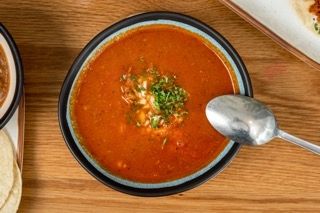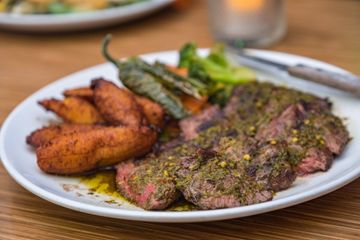Make every bite count with lunch and dinner favorites that celebrate Mexico’s finest dishes
Is Mexican Food Healthy? Unloading the Nutritional Advantages of Standard Active Ingredients
The inquiry of whether Mexican food is healthy and balanced welcomes an expedition of its conventional components. Beans and corn act as foundational staples, abundant in healthy protein and fiber. Avocados supply valuable fats, while numerous natural herbs and seasonings include taste and health and wellness benefits - freshly made guacamole. With each other, these parts create a tapestry of nourishment. Nonetheless, the healthiness of Mexican cuisine often depends upon prep work approaches and part dimensions. What duty do these factors play in identifying its total dietary value?
The Power of Beans: Protein and Fiber-Rich Staples
Although usually neglected, beans function as a keystone of Mexican food, offering a riches of dietary benefits. Rich in protein, they are an exceptional plant-based alternative for those looking for to fulfill their nutritional protein needs. This high healthy protein material supports muscle mass fixing and growth, making beans invaluable for both vegetarians and meat-eaters alike. Furthermore, beans are an extraordinary resource of dietary fiber, which aids in food digestion and advertises a feeling of fullness, possibly helping with weight management.
The variety of beans utilized in Mexican recipes, such as black beans, pinto beans, and kidney beans, adds to a diverse taste account and can enhance meals nutritionally. Beans are reduced in fat and consist of essential vitamins and minerals, including magnesium, iron, and folate. Together, these attributes make beans an important active ingredient, delivering both sustenance and nutrition in traditional Mexican fare.

Corn: a Versatile Grain With Nutritional Advantages
Corn sticks out as a flexible grain essential to Mexican cuisine, celebrated not just for its culinary applications but also for its remarkable nutritional account. As a key component in recipes like tortillas, tamales, and pozole, corn offers crucial nutrients that contribute to a well balanced diet regimen. Rich in carbs, it acts as a substantial power source, while likewise being reduced in fat, making it a favorable choice for numerous dietary needs.
Corn is a good resource of dietary fiber, which assists in digestion and advertises satiety. It has considerable amounts of vitamins such as B-complex vitamins, which are necessary for energy metabolic rate. The presence of antioxidants, specifically carotenoids, adds to general health by reducing oxidative stress. Furthermore, corn is gluten-free, satisfying those with gluten level of sensitivities. In general, the nutritional benefits of corn highlight its relevance in conventional Mexican food and its function in a healthy diet.
Avocados: Healthy And Balanced Fats and Nutrients in Every Bite
Avocados play a substantial role in Mexican cuisine, complementing dishes with their velvety appearance and rich flavor. Beyond their cooking allure, avocados are celebrated for their excellent dietary account. They are an abundant source of healthy monounsaturated fats, which can assist reduced bad cholesterol levels and assistance heart health. Furthermore, avocados are loaded with essential minerals and vitamins, consisting of potassium, vitamin E, and B vitamins, adding to total wellness.
The high fiber content in avocados aids digestion and promotes satiation, making them a helpful addition to any type of dish. Their distinct nutrient structure can likewise support skin health and wellness and give anti-inflammatory benefits. Integrating avocados into standard Mexican meals or appreciating them as a standalone treat can enhance both taste and nourishment, demonstrating why they are a cherished staple in Mexican cuisine. Generally, avocados use a tasty way to appreciate healthy fats and essential nutrients in every bite.

Flavors and Natural Herbs: Flavorful Health And Wellness Boosters
While enjoying the rich tastes of Mexican food, one can not neglect the necessary function that spices why not look here and herbs play in boosting both taste and health and wellness. Ingredients such as cilantro, oregano, and chili peppers not just add to the vibrant taste profile however likewise give significant health and wellness benefits. For instance, cilantro is recognized for its purifying residential properties, assisting to get rid of hefty metals from the body, while oregano is packed with antioxidants and possesses anti-inflammatory effects.
Chili peppers, a staple in lots of Mexican meals, have capsaicin, which has been linked to improved metabolism and pain relief. In addition, spices like cumin and coriander support food digestion and might help in blood glucose policy. Integrating these delicious health boosters into meals not only enhances the cooking experience however likewise promotes total well-being, making Mexican food not just tasty, however also nutritionally helpful.
Typical Food Preparation Approaches: Enhancing Nutrition and Taste
Conventional cooking approaches in Mexican cuisine play a necessary role in improving both nutrition and flavor, as they typically focus on classic methods and fresh components. Methods such as nixtamalization, where corn is saturated and prepared in an alkaline option, not just boost the nutrient profile of tortillas however also improve their digestibility - New York Times rated. Additionally, making use of slow food preparation techniques, like stewing or braising, enables flavors to fuse perfectly while maintaining the integrity of the active ingredients
Often Asked Concerns
Are Mexican Food Portions Usually Larger Than Other Cuisines?
Mexican food portions are often bigger than those of numerous other foods. This particular shows traditional eating methods, emphasizing public sharing and hearty meals, which can cause a more considerable serving dimension on the whole.
Exactly how Does the Prep Work Technique Affect Healthiness of Mexican Food?
Prep work techniques significantly affect the healthiness of Mexican food. Techniques such as cooking or steaming protect nutrients, while frying can increase undesirable fat content. Selections of components and cooking styles inevitably identify overall nutritional value.
Can Mexican Food Be Tailored for Particular Dietary Restrictions?
Mexican food can without a doubt be customized for particular nutritional limitations. Substitutions, such as utilizing corn tortillas for gluten-free diets or integrating Recommended Site even more vegetables, enable people to delight in traditional flavors while suiting numerous nutritional requirements.
What Are Usual False Impressions About Mexican Food and Health And Wellness?
Usual misunderstandings regarding Mexican food consist of the idea that it is inherently undesirable, excessively zesty, and solely focused on fats. In fact, traditional dishes commonly include nourishing ingredients and can be go to these guys tailored to different nutritional demands.
Exist Much Healthier Options at Mexican Restaurants?
Healthier alternatives at Mexican restaurants usually consist of smoked meats, beans, and fresh veggies. Choosing dishes that emphasize whole ingredients and staying clear of hefty sauces can lead to an extra nutritious eating experience, promoting general wellness.
The selection of beans made use of in Mexican dishes, such as black beans, pinto beans, and kidney beans, contributes to a diverse taste account and can improve dishes nutritionally. Avocados play a substantial function in Mexican cuisine, matching meals with their creamy structure and rich flavor. Incorporating avocados right into typical Mexican meals or enjoying them as a standalone snack can boost both taste and nourishment, showing why they are a precious staple in Mexican food. While appreciating the rich flavors of Mexican food, one can not ignore the necessary role that spices and herbs play in boosting both preference and health and wellness. Conventional cooking approaches in Mexican cuisine play an important duty in enhancing both nourishment and flavor, as they frequently prioritize fresh active ingredients and classic techniques.